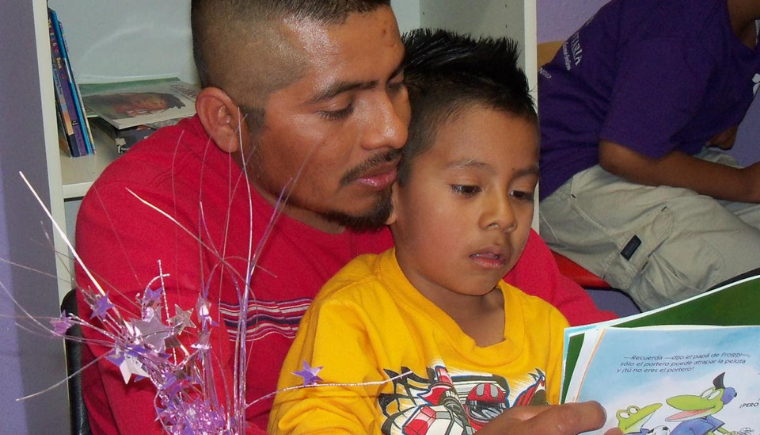How the Family Resource Center Association and Family Resource Centers work in partnership

Family Resource Centers (FRC) act as a one-stop location to help families access services that will support them in achieving stability. FRC’s serve as vital community hubs providing information, resources and referrals to internal and community programs.
About 25% of all families who come to an FRC participate in a service called Family Development, which serves as one-on-one family-driven support to create prioritized goals. After receiving Family Development services, families are better able to meet their own basic needs for food, clothing, housing and transportation, and are better equipped to know how to access essential services such as child care, health care and mental health services.
Services offered by FRC’s are family-centered, strength-based, coordinated to meet families’ unique needs and focused on prevention, long-term stability and success. Support and resources provided help strengthen protective factors that are known to prevent child abuse and neglect.
Working together
The Family Resource Center Association (FRCA) works in partnership with FRCs in the same way that FRCs work in partnership with communities to help connect families to the resources and support that they need. Just as families are the experts of their lived experiences, FRC’s are experts in their local communities.
The impact of Family Resource Centers in the community
An encouraging and active community plays a vital role in supporting children and their families, which in turn makes the entire community stronger. Each of us plays a role in supporting Colorado’s children – even those of us who are not caring for kids day today.
The FRCA annual evaluation report shows that after receiving services from their local FRC, parents demonstrate more positive parenting behaviors, strengthened problem-solving and resiliency (ability to bounce forward from hard times), increased informal and emotional supports (more social connections), increased nurturing relationships with their children, and increased access to resources in times of crisis or need (concrete supports).
The most recent evaluation results, a measurement from prior to and during COVID-19, indicate that FRCs were a meaningful resource for families across Colorado during a time of crisis; as vulnerabilities increased, FRCs continued to support families who needed additional support in working toward and achieving their goals. FRCs were able to effectively serve their communities at this difficult time because they were already trusted and known to provide assistance in culturally sensitive ways.
–
“We are helping Family Resource Centers do their important work in helping families and children not just survive but thrive. Our member Family Resource Centers are proud to serve their communities, and this motivates me to serve them as part of the Association team. This work makes our communities stronger and more resilient.”
– Teri Haymond, Program Director, Family Resource Center Association
–
FRCA and a local FRC step up to provide extra support to families amidst COVID-19
In response to COVID-19, the FRCA helped facilitate a $2.9 million shipment of much-needed baby supplies (diapers, formula and wipes) from the Federal Emergency Management Agency. Twenty-six FRC’s were among the 41 community organizations that received and quickly distributed the supplies to families in need.
FRC’s in rural and frontier counties are instrumental in supporting families. Bright Futures is the Family Resource Center in Southwest Colorado supporting the communities in San Miguel and Ouray counties. Offering parenting workshops, family support services and social-emotional support for parents, Bright Futures has been dedicated to improving the lives of children and families since 2001. As COVID-19 began to impact families, Bright Futures made a commitment to provide whatever support that family and child care providers needed to navigate the pandemic.
“As COVID-19 began to affect rural areas, the needs that arose were vast. It appears that the biggest impact has been economic as families have struggled to keep basic needs met. One family, in particular, has utilized Bright Futures and the resources available to lessen the burden that this has placed on her. This single mother works cleaning houses and because lodging was shut down, her work was as well. We were able to provide pullups, wipes, rent assistance and a gift card to the local grocery store to her to help her get through. We were also able to help her connect to LEAP in order to get her utilities paid and connect her to the local food bank for even more stability. Not only were we able to provide monetary support but emotional support as well. Recently this client was granted a scholarship for child care to continue to help her work her way up to a more stable place in life and she has stated that without help from Bright Futures, she is not sure how she would have accomplished anything during this pandemic.”
– Reflection from a Bright Futures for Children Parents as Teachers educator
To learn more about the impact that FRCs have made on Colorado families and communities, check out the latest annual evaluation report executive summary.
The Colorado Department of Human Services CO4Kids campaign encourages all Coloradans to strengthen families and communities. If you know of an organization or individual working to strengthen Colorado families and communities that would like to be highlighted, please reach out to Dianna Robinson.
To learn about the signs of child abuse and neglect and for information about how to become a foster or adoptive parent, visit CO4Kids.org. Call 844-CO-4-Kids to report concerns about child abuse and neglect. If a child or teen is in immediate danger, dial 9-1-1.
More Posts



